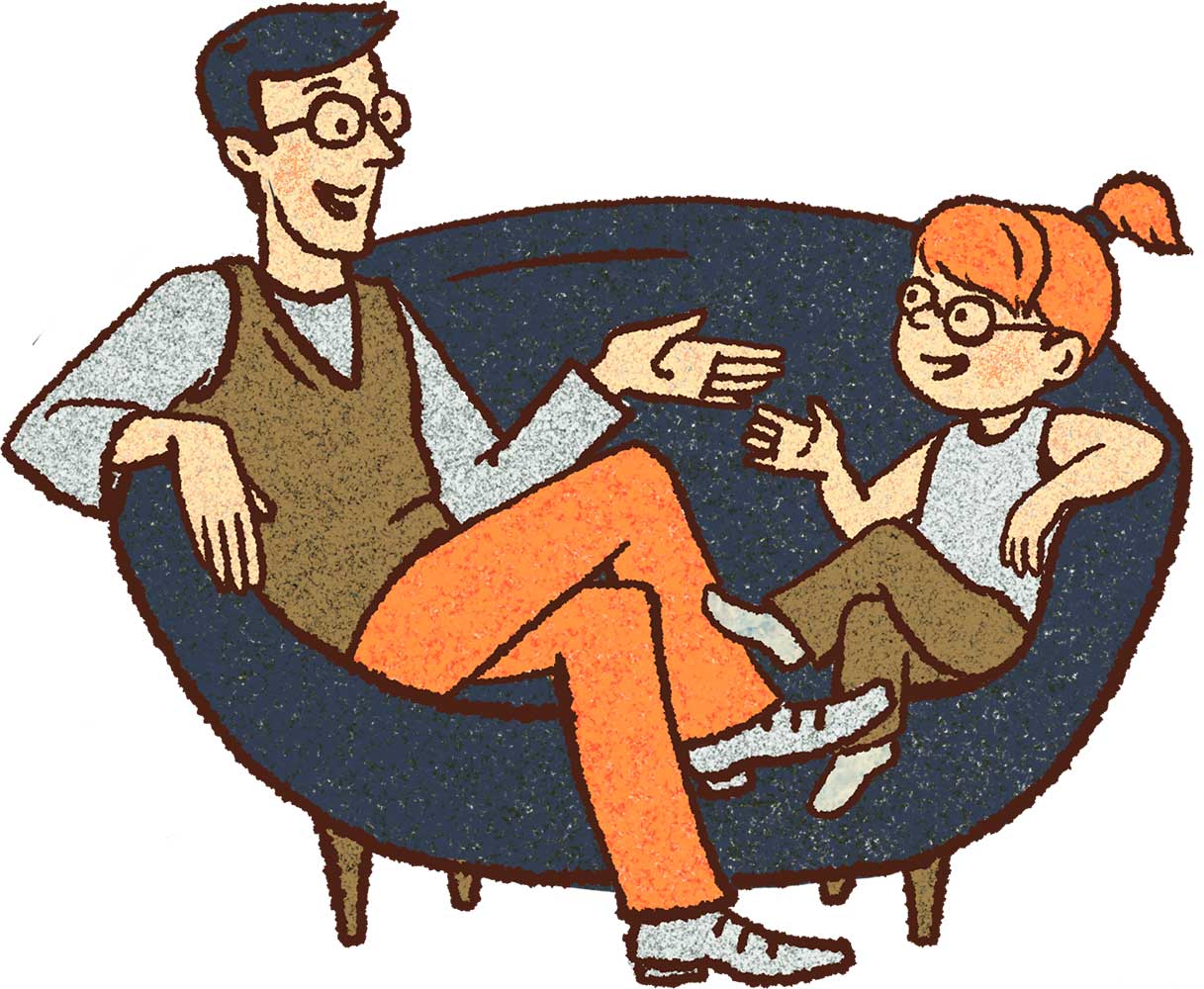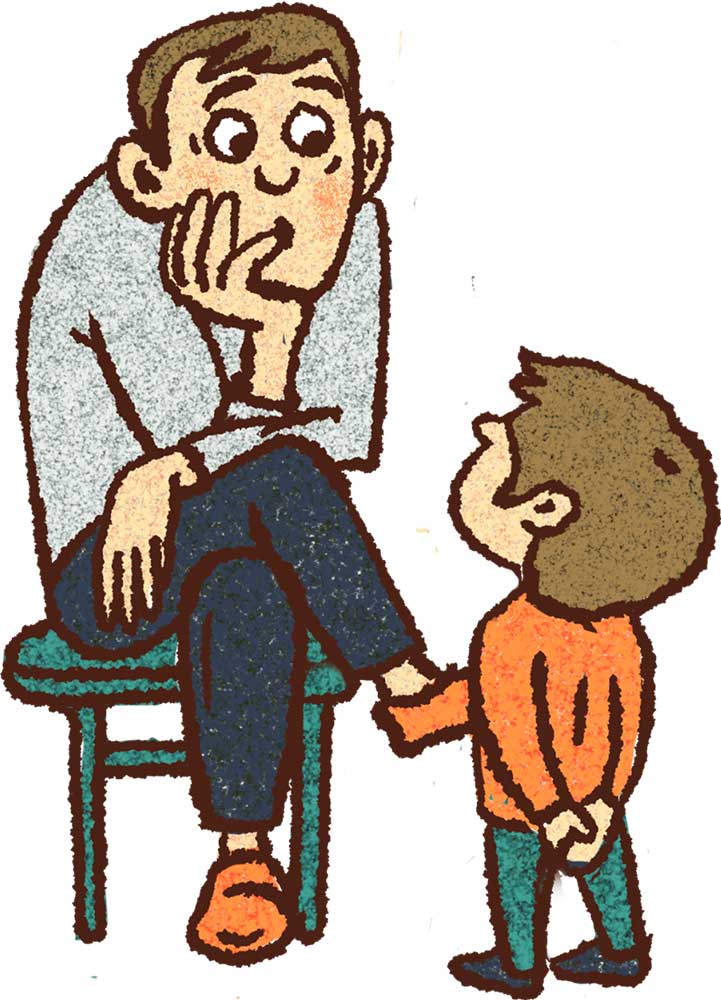Introduction

Dear parents and guardians, we are pleased that you have discovered our offer. This means that you are one of the adults who would like to accompany children safely and well on their way to adulthood, including in the area of sexual education. We would like to help you with this. Because: very few adults have learned to talk naturally about topics such as the body, love, sexuality and identity. Each person therefore has their own "sex education backpack" - well filled for some, but quite empty for others.
We want to help you fill the "individual compartments" of your backpack - so that you can answer all of the questions your children may have during their childhood and adolescence and are likely to ask you only when they realise that they will also get answers.
As adult family members, you are the first contact person(s) for your children - even if they have dedicated people in kindergarten and/or school who provide age-appropriate and sensitive sex education. You are the one who will name all parts of the body at the changing table or leave some out; who may answer questions about sexuality with "you are too young for that" or "interesting question, I have to think about how to answer it first."
The earlier you start to talk about the body, love, relationships, sexuality and identity as normal everyday topics, the easier it is for you - and also for your children. The older they get, the more embarrassing so-called "sex education talks" become. It is not uncommon for both sides to breathe a sigh of relief after these are over. It is better to guide your kids gently. Children who have learned that they can come to you with their questions and receive serious and accurate answers will also turn to you with their questions for a long time.
Parents want the best for their children. Therefore, it is even more important that you take any negative attitudes towards sexual education (be it through your own upbringing or media influences) seriously. We would like to offer you the opportunity to engage with this.
Sex education is an important part of abuse prevention because it makes things accessible to children by providing them with the words and information they need to express and communicate themselves in case of uncomfortable situations. You do not need to worry about overburdening your children with age-appropriate, loving sex education, or taking away their "innocence": You are taking away their ignorance. That is a big difference.
Children are sexual, because they are sexual beings, from the very beginning, not just from puberty. It is important not to compare children's sexuality with adult sexuality, but it is mainly characterised by playful, childlike curiosity. Observable behaviours include, for example, childlike exploration of the body, desire to look and show, and asking questions. Children are interested in differences between the sexes and how they themselves came to be from an early age.
Responding to questions sensitively and in an age-appropriate way does not "sexualise" children. It helps them to find a language. In this way, sexual education strengthens their self-confidence and protects them from assaults, as they can classify sexual acts better.
And for children who do not seem to have any questions? Maybe the questions were "overheard" or were considered "too early"... Children have very fine "antennas" and know who they can go to with their questions. If their thirst for knowledge is not satisfied by adult caregivers, they quickly find other ways (older siblings, media...). An educational book or a website is always a good introduction to the topic. It is important that you take your time beforehand and see whether the presentations, pictures, videos and also the language seem appropriate to you.
No adult can avoid "doing" sex education in some form: it begins with naming all the body parts at the changing table. How and if you answer a question later shows the child your attitude and values. Talking about the topics you encounter here is always linked to a value attitude that you pass on to your children. It therefore makes sense to think about these values at an early stage.
Pause for a moment: how, when, and where were you "enlightened" and by whom? Which topics came up? Which ones were left out (why)? How could it have been better? Did you have the education you would like your child to have? No? Then you belong to the vast majority. The good news: You can do better! And that is exactly what we would like to help you with.
This does not mean that you need to be a professional in all these matters. When your child asks you a question and you do not have a child-friendly answer in mind, take the time to think about it. Be authentic by saying, for example, "my parents did not educate me very well, but I want to do better." Get books that are appropriate for the age group and/or take a look at our app.

And why so early?
- Because children become interested in gender differences at a very early age. This is not just about boys or girls, but about the perception of multiple femininities and masculinities. In this handbook, we use gender-neutral language which also makes people visible who cannot or do not want to fit into the two-gender system.
- Because children want to know where they "come from".
- Because they pick up sexualised terms/words in kindergarten and school and do not know how to interpret them.
- Because they are exposed to sexualised content in the media (from billboards to TV commercials to porn in digital media) at a very early age and porn in particular should not be the first introduction to the topic.
- Because knowledge empowers children when they encounter/perceive gender diversity in everyday life. Children can embrace diversity/diverse lifestyles when they know about it and this is important to be able to coexist effectively in our society.
- Because well-educated children tend to allow themselves much more time with their first time having sex later on as teenagers, because they know roughly what to expect and they will not give in to peer pressure so easily. Children become empowered and are more responsible in dealing with love, sexuality and relationships.
- Because well-educated children are better protected from sexual assault: they have names for all their body parts (so they can articulate earlier when someone has touched their genitals, for example) and they know where sexuality "belongs" - namely with older adolescents or adults, if that is what both of them want. And that you are not allowed to do that with children.
- Because sex education is one of the most important building blocks in the prevention of child sexual abuse. The majority of perpetrators come from the child's close social environment; warning against "bad strangers" falls well short of the mark.
It is perfectly fine, by the way, if children are embarrassed about the subject if they are not used to talking about it. It is okay to laugh! And they are also allowed to feel grossed out: Encourage your children to have these feelings by clearly telling them: "As a child, it might be hard to imagine that this might be something nice - but no one is allowed to do that to a child either!" In this way you have - without frightening the child - woven the prevention of child sexual abuse into an educational talk.
What is the role of psychosexual development in this?
In general, every child will develop at their own pace. Some children are interested in topics earlier, others a little later. Just like with other topics in life. If you listen to your child and pay attention to what they are interested in, you will know when they are ready for what. With books or other children's play materials (for example, dolls with sexual parts or puzzles representing types of families), you can introduce the topics to your child in a casual way.
This manual is divided into three age groups, which are taken from the WHO standards for sex education in Europe: 4-6 years old, 7-9 years old and 10-12 years old. The borders are fluid and not all learning steps fall into the age groups mentioned.
The following table shows which developments and areas of interest are to be expected for each age group and what kind of parental guidance these are associated with. The ages are approximate, no child is a "normal" child.
| Age | |
|---|---|
| 0-4 years old |
|
| 4-6 years old |
|
| 7-9 years old |
|
| 10-12 years old |
|

